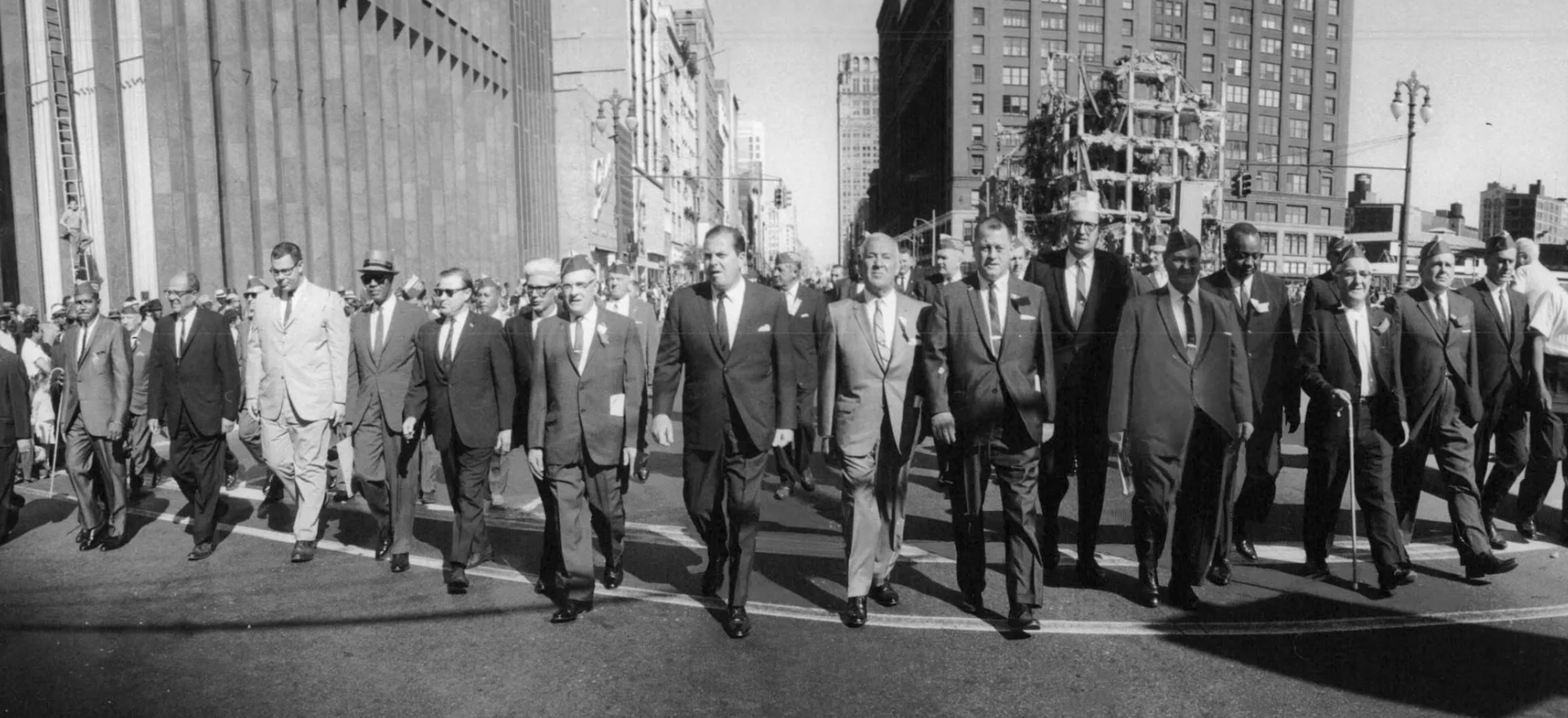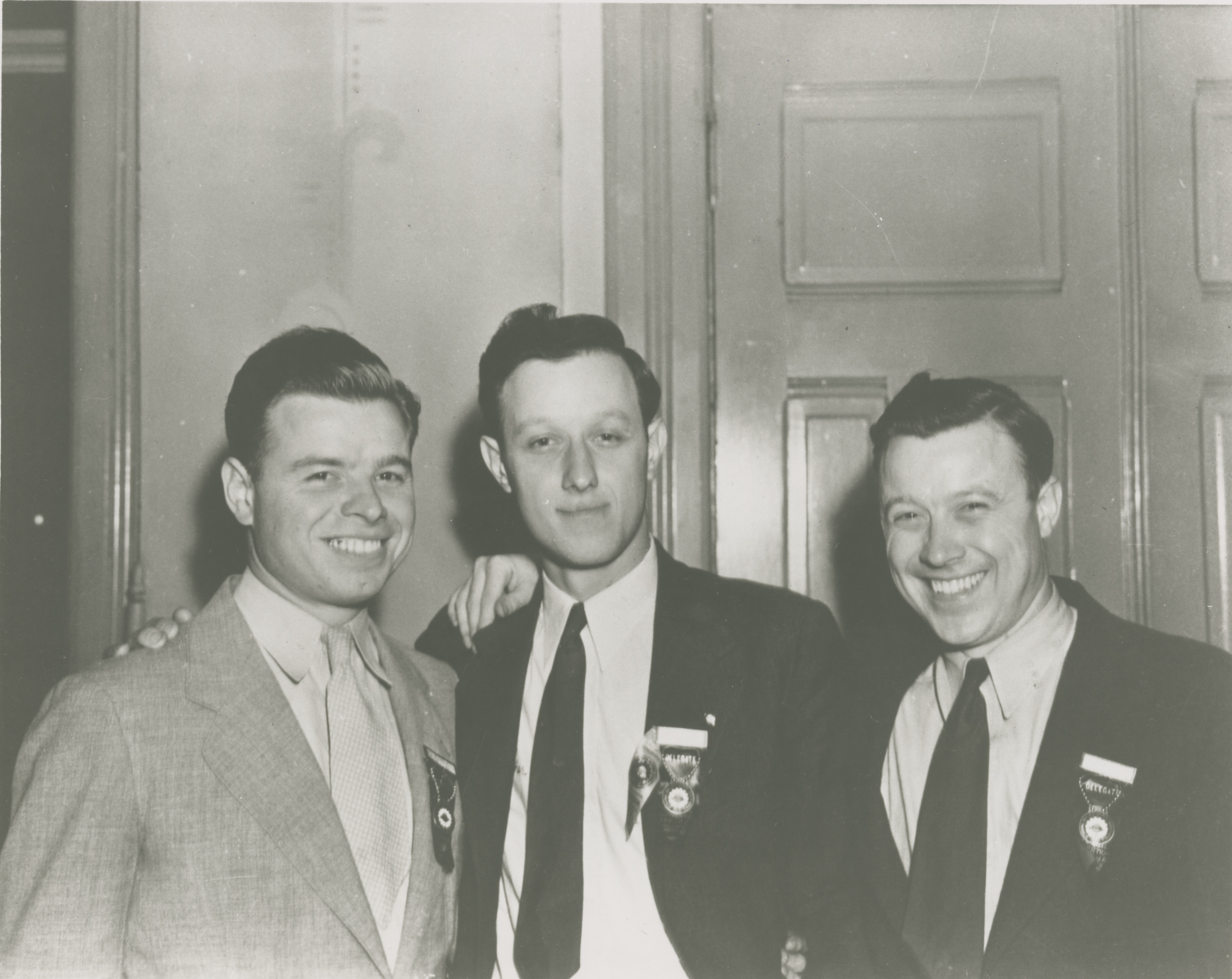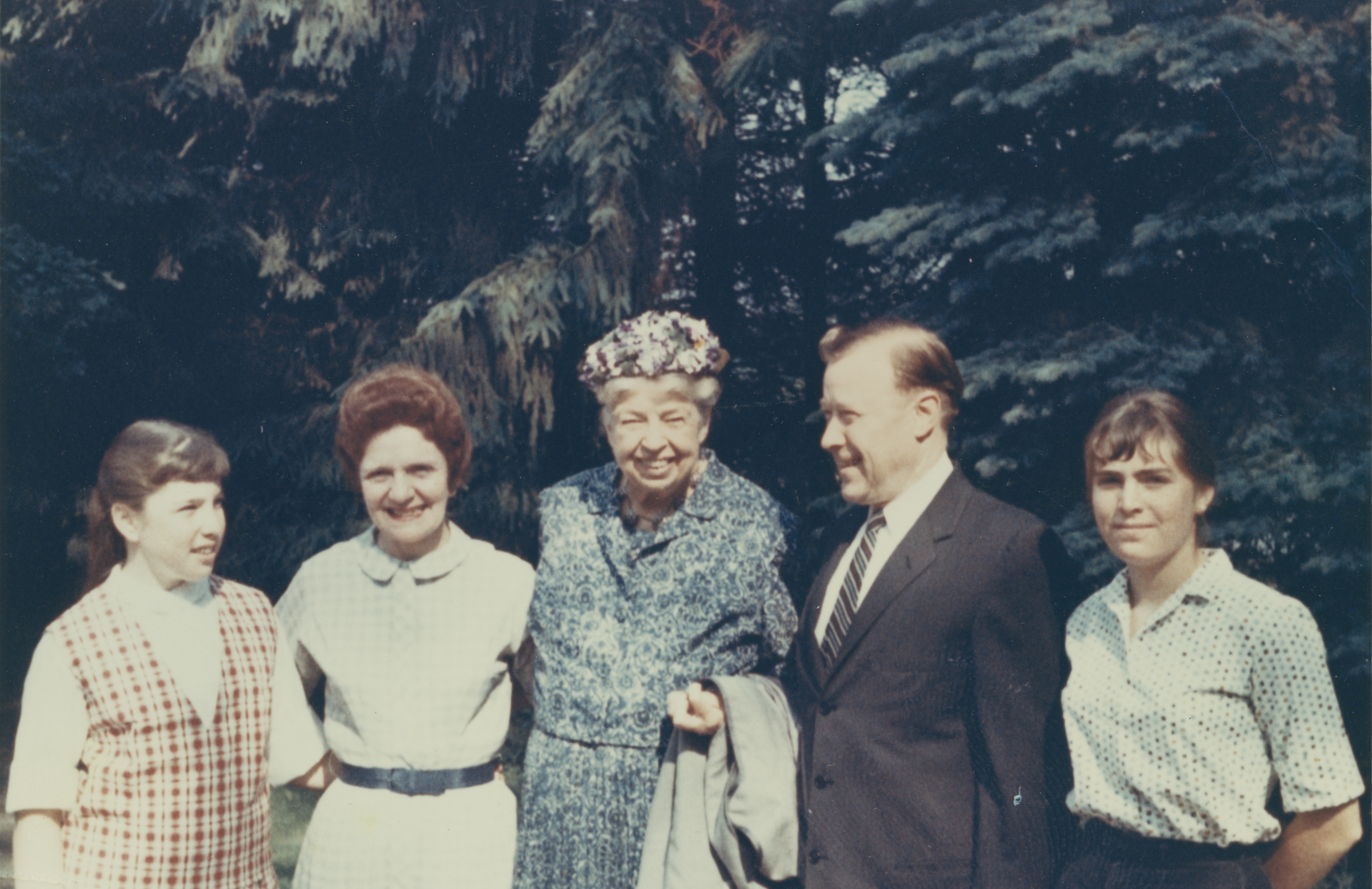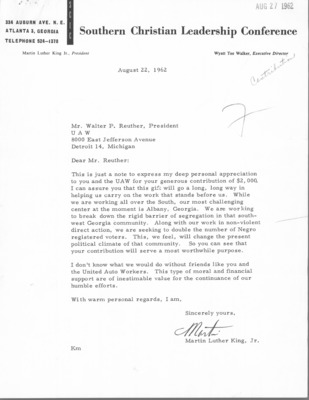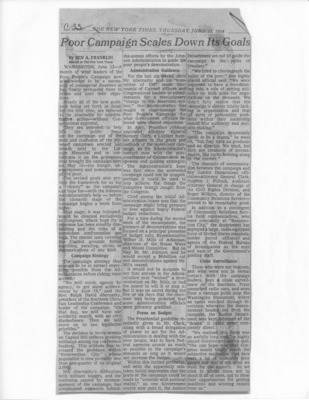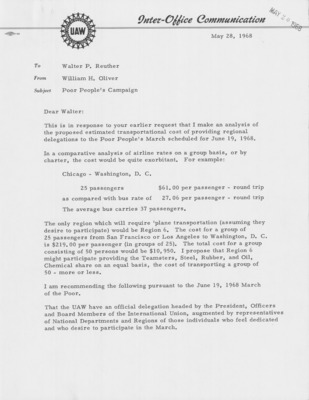United Automobile Worker
Item
- Title
- Date
- Alternative Title
- extracted text
-
United Automobile Worker
-
1949-01-01
-
Vol. 13 No. 1
-
GH
Y
y
Yj
QGyYepnyv7
13, NO.
Zi
ZZ
JANUARY,
1
1949
eySst 0
:
cen
VOL,
Yield
Y
wwnsvyy
YI,
_
y
Page Three
Profits, Production, Bottlenecks
Page Seven
UAW RADIO STATION IS DEDICATED
TO THE SERVICE OF ALL THE PEOPLE
Regular
Broadcasts
Begin
in February
Page Five
|
'
;
|
:
On December 19, this
bronze plaque was unveiled by UAW-CIO Secretary Emil Mazey.
It
reads: “‘Dedicated to the
Public Service of the
People of Detroit.’ Mazey and President Walter P. Reuther are shown
here viewing the plaque
following dedication
ceremonies at the Station. Reuther, addressing the throng of civic
and
that
be
labor leaders, said
the Station would
an
instrument
for
“lifting some of our
little Tron Curtains here
in America.”’
1949
UNITED
AUTOMOBILE
WORKER
Page
wo
January,
Bargaining Program Unveiled
Pension
To
Plans, Social
Security
Be Major Demands
President Walter P. Reuther, in a letter addressed to all
local unions, outlined the basic economie demands which were
adopted by unanimous action of the International Executive
Board at its meeting in Detroit, January 11, 1949.
The demands
in 1949
“| have great plans for you!”
Board Votes $1
Assessment
are as follows:
1. An adequate pension and retirement program.
2, A comprehensive social security program, including health,
hospitalization, medical and surgical and life insurance provisions.
3. A wage increase.to restore the buying power of wages to
the level of June, 1946, when OPA
Locals Asked to Prepare
z$
t:
The
ecutive
the
©
that
The International Executive Board recommends that all
local unions and corporation councils adopt these demands and
begin to prepare for their submission to their respective managements. In those plants and corporations where contract provision limits negotiations to wages, management should be requested to open negotiations on pension plans and social security plans by mutual agreement.
If management refuses to
agree to negotiate on pension plans and social security matters,
a wage demand in these plants shall be made equivalent to the
total cost of a pension plan, a social security plan, plus the costof-living adjustment required to bring wages into line with the
buying power of June, 1946.
i
Local unions will be furnished further details with respect
to the implementation of this program.
Two-Front Fight
“The demands formulated by the International Executive
Board are part of a fight-on two fronts. While we move toward
pensions and social security through collective bargaining, we
shall, at the same time, be working for national legislation covering retirement and health and medical care. On the legislative
est
Reuther
stated
further:
‘‘Wages,
of course,
are
still a problem and they still fall short of what the worker needs
to support his family in decency and security. While fighting
to bring up the purchasing power of the workers’ wage dollar
to the level of June, 1946, we are determined to place the major
emphasis
rity.
of our negotiations
on pension plans and social secu-
following
January
resolution:
program
requires
organizational
strength
10
Ex-
adopted
it
is
and
possible
the
great-
for
us
financial
to
achieve by the time we enter collective bargaining negotiations with
employers in the coming months.
During the past 14 months measures
put
into effect
by the
International Executive Board have
strengthened the financial position
of the International Union so that
it is now in the strongest ‘position
it has been at any time since during the war years.
Nevertheless,
our financial reserves are still too
small for a union our size. Much
greater reserves are needed to back
up
who cannot possibly save for
ings.. These double standards
ally indefensible and we are
power and resources of our
social security for our people
their old age out of current earnare economically stupid and mordetermined to mobilize the full
union to win pension plans and
in the coming negotiations.’’
President Reuther, in his letter to the local unions, made it
unmistakably clear that pension plans and social security demands can no longer be considered fringe issues. They will be
advanced as the major demands of the UAW-CIO. The profits of
industry are at an unprecedented high level and management
can afford to meet these just demands, which are long overdue,
out of profits without increasing prices.
front, we can expect to win only basic national minimums for
He said: ‘We are prepared to sit at the bargaining table
all our citizens, These minimums, however, will not be high
enough to meet the needs of our members, They will require with the representatives of management and to do everything
in our power to work out an intelligent and constructive solusupplementation through collective bargaining.’’
tion to these problems. Management cannot continue to shirk
its responsibility to its workers. We are hopeful that we will be
Wage Increases
President
Board
International
WHEREAS, The UAW-CIO faces
in the very near future the job of
winning the pension plan, social security and wage demands outlined
in our Economic Program for 1949.
The effective implementation of
was destroyed,
“The International Executive Board has considered the political and economic and legislative climate in which our 1949
negotiations will be conducted,’’ President Reuther said. ‘‘We
believe that a great opportunity lies ahead. This year we can
and must bring into the lives of our members a substantial
measure of security against the hazards of old age and physical
illness and disability.
UAW-CIO
able to work out these matters through rational and peaceful
collective bargaining. However, if management continues in its
refusal to meet the problem of the workers, we shall be prepared
to use all the weapons possessed by free labor.
Increase
Union
our
collective
bargaining
posi-
tion and to meet major emergencies which might arise,
Therefore; be it
RESOLVED, That by the authority veste@in it by the International
Constitution, the International Ex| ecutive Board hereby votes an as| sessment of $1.00 on each-member
of the International Union, UAWCIO, as of February 28, 1949:
|.
That
this
assessment
must
be
paid during the months of March
and April of 1949, or within the
time limit required by Local Union
By-Laws; >
That in accordance with the provisions of the Constitution, Local
Unions shall not issue an official
dues receipt for the month of May
unless
the
assessment
has
been
paid;
That moneys received from the
assessment shall be set aside in a
reserve fund and shall be used only
for donations to the welfare funds
| of Local Unions conducting author-
| ized
strikes
and
other
emergency
| Purposes specially approved by
International Executive Board.
the
Know Luther Cooper?
Reserves
Luther
Cooper,
about
65,
has
a
“To further strengthen the union’s financial reserves in sup- share in an estate “well worth
port of the implementation of the above demands, the Interna- claiming,” according to Coy N.
j Overaker,
attorney,
1020
Illinois
tional Executive Board, by unanimous action and in accordance
No More Double Standards
Bldg., Springfield, Dl.
with the provisions of the Constitution, voted to levy an assess-|
The
last information
his: rela“We in the UAW-CIO are no longer willing to tolerate a ment of one dollar per member. A set of
just demands, backed jtives had about Cooper was that
continuation of double standards in our industry. Under these up by the power and determination of
the membership and sup- he was an auto worker somewhere
in Michigan.
double standards, top corporate executives provide generous ported by a strong union treasury,
Anyone knowing
his
are a winning combination | whereabouts shou
ld notify the atpension plans for themselves while denying them to the workers, in collective bargaining.’’
torney.
%
CIO GROUP MEETS BRITISH
TO DETERMINE WFTU FUTURE
B.
Carey,
UAW-CIO
SecretaryTreasurer
Emil
Mazey,
President
L. S. Buckmaster of the CIO United
Rubber
Workers,
and
SecretaryTreasurer
David
J. McDonald
of
the Steelworkers.
Mazey in London
With Committee
A committee of four CLO Jead;ers is in London this month to
confer with leaders of the British Trades Union Congress on
international
labor cooperation
On
a number
of questions,
the
convention
resolution
said,
“the
CIO found itself
British TUC and
union
centers
| trade
against
unions
| ters
allied
and
their
aligned with the
othew free trade
and
with
trade
them,”
the
union
Soviet
cen-
and to determine a future course
The most important of the quesof action in relation to the} Uons was the Communist opposi| tion to the Marshall Plan, the resWorld
Federation
of Trade
} olution
charging
that
the Soviets
Unions.
4
W
The
grit
Guernvey-Montgomery for the Economie Outlook, ClO,
)
j
‘
committee,
President
national
ot
ClO
Philip
appointed
Murray
convention
action,
by
C1O
following
Secretary-Treasurer
consists
James
a
satellites
campaign
restore
1945
against
Europe's
through
WF'TU
agreement.
:
had
in
this
“conducted
effort
economic
violation
of
to
life"
their
Page
UNITED
4
AUTOMOBILE
WORKER
January, 1949
———————SSSSSSS————Seeeeeeeeeee——————————eeeeee
eeeeeeeEeEeEeeeSeSSS
UNITED AUTOMOBILE WORKER
|
OFFICIAL PUBLICATION, International Union, United Automobile,
Aircraft and Agricultural Implement
Workers of America, affiliated
with the CIO.
Published monthly.
Yearly subscription to members, 60
cents; to non-members, $1.00. Entered at Indianapolis, Ind., November
19, 1945, as second-class matter under the Act of August 24, 1912, as
a monthly.
Please send notices of change in address on Form 3578, and copies
returned under labels No. 3579 to 2457 East Washington Street, Indianapolis 7, Indiana.
Circulation Office: 2457 E. Washington St., Indianapolis 7, Indiana
Editorial Office: 411 West Milwaukee, Detroit
WALTER P. REUTHER
President
International
Executive
Board
CHARLES BALLARD
RAY BERNDT
GEORGE BURT
DONNEL.CHAPMAN
ED COTE
MARTIN GERBER
PAT GREATHOUSE
CHARLES H. KERRIGAN
MICHAEL F. LACEY
a
LIVINGSTON
Members
RUSSELL LETNER
NORMAN MATTHEWS
WILLIAM McAULAY
JOSEPH McCUSKER
PAUL E. MILEY
C. V. O'HALLORAN
RICHARD E. REISINGER
THOMAS J. STARLING
LEONARD WOODCOCK
FRANK WINN, Editor
BARNEY B. TAYLOR, Managing
CLAYTON
Members,
EERaeeeAeERENeEE
GOSSER and JOHN W.
Vice-Presidents
EERE RRR
RICHARD
EMIL MAZEY
Secretary-Treasurer
Editor
W. FOUNTAIN, Associate Editor
American Newspaper Guild, CIO
Editorial....
PRESIDENT
PEOPLE.
TRUMAN
IS
KEEPING
FAITH
WITH
THE
—Acme
President Reuther is interviewed by reporters as he leaves the White
House following his conference with President Truman.
(See story
In his State of the Union message he has made it clear to Con>
gress and to the nation that he respects the mandate of the American below.) people who declared in effect on November 2 that they- want a
liberal, progressive administration that will go forward from Franklin Roosevelt's New Deal. In his demand for social legislation and Advisors
repeal of the Taft-Hartley Act, the President is observing to the
letter the position he took on the vital issues on which he campaigned,
on which he won the support of the broad farmer-liberal-labor coalition, and for which thegpeople voted.
That portion of his message on breaking the steel bottleneck goes
even beyond the letter, but remains within the spirit, of the progressive program President Truman put before the people during the
campaign. He recommended to Congress a survey of steel capacity
to determine how far short it comes of meeting our country’s needs.
On the basis of that survey, he declared, the steel industry should be
given an opportunity to expand capacity to meet the requirements,
encouraged to do so if necessary by government financing. But if
the management
the government,
of the steel industry refuses to take this step, then
the President said, must build and operate plants
itself to meet the steel deficit. This is the kind of action President
Reuther and the UAW-CIO has been urging ever since the UAWCIO members were first plagued by layoffs and short work weeks as
a result of the steel shortage.
We think that even more than President Truman’s advocacy of
needed social legislation and his demand that the 81st Congress cor-
rect the
mistakes
of the 80th,
his ability
to extend
the logic
of his
Photo,
Urge
Wage-Price Parley
WASHINGTON
(LPA) —A conference of labor, management, agriculture
and
public
representatives to set up wage
and price
standards for a healthy economy
was suggested by the President’s
economic
advisors
recently.
“A wage structure in relation to
prices that will maintain the producing power of industry and the
buying
power
of labor
in sound
proportion”: is essential to avoid
economic breakdowns, the Council
of Economic Advisors declared in
its Third Annual Report.
Occasional strikes, the economists
pointed out, may do less long-run
damage
to the
economy
than
is
done by settlements which “do not
reflect the economic requirements
for sustained
general
prosperity,
but reflect only the relative strength
of the parties.” This is what labor
has been saying for the past two
years when
it went into negotiations seeking wage raises without
disastrous price rises.
It is what
union
representatives
have
been
saying when they warned that corporations cannot continue to take
exorbitant profits without inviting
eventual economic collapse.
program to such vital matters as the steel bottleneck reveals him as a
person of great courage’and social vision. It is this kind of thinking
and action that is the mark and the test of aggressive and progressive
leadership.
President Reuther has already informed the President that the
UAW-CIO will support his legislative program in every way possible.
We are sure that the vast majority of the American people will
support it. There are no doubt some Congressmen and Senators who
The Council of Economic Adviswill resist it. We would suggest to those Congressmen and Senators
ors was set up under the Employthat they meditate solemnly upon the fate of Senator Ball and other ment Act of 1946 to study the funccasualties of the 80th before making up their minds. The people have tions of the national economy and
spoken out and they were talking to the legislative, as well as to the report to the President on ecoexecutive branch, of government when they spoke out for liberalism nomic problems. Its members are
Edwin G. Nourse, Leon H. Keyserand progress.
ling and John D, Clark.
Truman and Reuther
Have Satisfactory Talk
WASHINGTON—Following a White House conference with
President Truman, Dee. 15, UAW-CIO President Walter P.
Reuther expressed confidence that the President would work
actively for the early enactment of the full program on which
he campaigned, He pledged the UAW-CIO’s full support in that
effort.
ASKS
BOTTLENECKS’
END
In his talk with the Presidenf,
Reuther urged action to break production bottlenecks in steel, power,
aluminum and other necessities for
a stable full employment economy
that would provide a steadily rising standard of living for all the
American people.
©
work done by the UAW-CIO during the 1948 campaign, as told in
pamphlets,
posters,
radio
broadcasts, etc. The President displayed
keen interest and appreciation and
showed
Reuther some prize samples of Republican over-confidence.
PUSH
CIO
PROGRAM
Reuther was in Washington
to
attend the Dec. 14 meeting of CIO
the CIO
trade union forces in Europe,
in- Vice-Presidents, at which
cluding Germany, pointing out that legislative program adopted at the
Communist
propaganda,
aid
and Portland convention was reviewed
pressure are being poured into a and plans made for strategy in promoting
enactment,
breaking
the
campaign to win over or capture
Rules Committee
strangleworkers’
organizations
there
as House
hold, improving liberal strength on
elsewhere.
key
committees
in both
Houses,
PRESENT FOR PRESIDENT
and
better
coordination
of
the
Reuther presented President Tru- work of the CIO Legislative Comman with a “lookit book,” a large
mittee consisting of the Legislative
leather-bound
volume
containing Representatives
of affiliated
CIO
the story of the Political Action} unions.
He also urged more support and
encouragement for the democratic
ANOTHER FORD PLANT
VOTES UAW, 859 T0 68
The UAW-CIO has won bar-¢
gaining rights for 1,163 workers at the Ford plant in Canton, Ohio, followmg an NLRB
election in which UAW defeatFor the first time in its history,
ed the AFL, 859 to 68. Twenty- the General Motors Corporation
four workers voted for ‘‘no has agreed to set aside one per
cent of its production of cars for
union.”’
purchase by its workers, according
Region 2 Director Richard E.
to T. A. Johnstone, Assistant DirecReisinger said the unit covered tor of the UAW-CIO GM Departall production and maintenance ment. Hitherto, Johnstone said,
employes,
including those in only the corporation’s high brass,
including
foremen
but
no
lesser
the heat-treat department.
personages,
had
priority
to buy
The UAW failed by a nar- cars.
row margin to win a majority
The
corporation
refused,
howamong the 109 die sinkers and ever, to grant any. discounts to its
has
requested
an
immediate employes, who must watch the cars
come off the assembly. lines, go to
runoff election in that unit. The the dealer
and finally get back to
International Die Sinkers Con- them after the various middle men
ference will be on the ballot.
have had their cuts.
GET CHANCE TO BUY
THE CARS THEY MAKE
ClO.
Gvernsey-Montgomery for the Economic Outlook,
UNITED
January, 1949
AUTOMOBILE
WORKER
Murray Asks
CIO to Support
y;
Dime Drive
NEW
YORK—An
stinted
LiKE
ti
support
of
the
of Dimes has been
Murray, President
of
Industrial
union
at
appeal
members
for
1949
YY
iD
fyjyfui WY
Y
4YyGY
LigY
un-
YH
tip
ey
YOY
a
WEE
March
issued by Philip
of the Congress
Organizations,
of his
to
all
organization.
In a letter to Basil O’Connor,
President of the National Foundation
Infantile
for
Paralysis,
Murray
pointed
to the
of 1948,
which,
he said,
dicates
that
cannot
relax
the
dreadful
ysis.”
the
polio
record
“clearly
American
their
Mr.
in-
Vtg V3
people
guard
against
toll of infantile
paral-
The statement by the labor leader comes in the wake of polio epidemiecs
than
which
27,000
in
1948
victims
claimed
and
more
cost
the
National Foundation and its chap-|
ters upwards of $17,000,000 for care
and treatment alone.
Mr.
Murray
good
to
stated
know
that
that
the
“it
J
Y
is
i hs
National
Foundation for Infantile Paralysis
is leading the noble campaign to
care for the victims of this disease
and
to
finance
the
constant
“yy
re-
search, the aim of which is to eliminate the disease from the country
and our world.”
The Congress of Industrial Organizations, Mr. Murray said, will
lend its warmest
support to the
March of Dimes, Jan. 14-31.
This is a people’s
mobilization
against disease and suffering,” Mr.
Murray said. “I know that the millions of members of the CIO will
contribute generously to this splendid cause.”
UAW-CIO’s four top officers launch the union’s annual March of Dimes Campaign from President Reuther’s office in Detroit. They are pictured above with Emma Murphy Dirickson, staff member of-the National
Foundation
Truman’s
for Infantile Paralysis.
State-of-Union
We haye rejected the discredited theory that the
fortunes of the nation should be in the hands of a
privileged few. We have abandoned the ‘‘trickledown’”’ concept of national prosperity. Instead, we
believe that our economic system should rest on a
democratic foundation and that wealth should be
created for the benefit of all.
On
What’s Wrong
As we look around the country, many of our shortcomings stand out in bold relief.
We are suffering from excessively high prices.
Opr production is still not large enough to satisfy
our demands,
Our minimum wages .are far too low.
Small business is losing ground to growing monopoly.
Our farmers still face an uncertain future. And
too many of them lack the benefits of our modern
civilization.
Some of
wasted.
our
natural
resources
are
still being
.
We are acutely short of electric power, although
the means for developing such power are abundant.
Five million families are still living in slums and
firetraps. Three million families share their homes
with others.
Our health is far behind the progress of medical
science. Proper medical care is so expensive that it is
out of reach of the great majority of our citizens.
Our schools, in many localities, are utterly inadequate.
Our democratic ideals are often thwarted by prejudice and intolerance,
On Boom
We cannot afford to float along carelessly on a
postwar boom until it collapses. And it is not enough
merely to prepare to weather a recession if it comes.
Instead, government
and businéss must work together constantly to achieve more and more jobs
and more and more production—which means more
and more prosperity for all the people.
I
recommend that the Congress
for the following purposes:
enact
legislation
First—To continue the power to control consumer
credit and enlarge the power to control authority
and to provide adequate machinery for its enforcement,
Fourth—To continue the priorities and allocation
authority in the field of transportation.
Fifth—To authorize priorities and allocations for
key materials in short supply.
We must remedy these shortages. Moreover, we
need—and we must have without further delay—a
system of prepaid medical insurance which will enable every American to afford good medical care.
On
On
Second—To grant authority to regulate specula
tion on the commodity exchanges,
Third—To continue export control authority and
to provide adequate machinery for its enforcement,
Taxes
I recommend, therefore, that the Congress enact
new tax legislation to bring in an additional four billion dollars of government
revenue.
This should
come principally from additional corporate taxes. A
portion should come from revised estate and gift
taxes.
Consideration should
income tax rates in
sonal
be
the
given
to raising
middle
and
brackets.
On
per-
upper
Taft-Hartley
At
present,
the
working
men
and
women
of
the
nation are unfairly discriminated against by a statute that abridges their rights, curtails their constructive efforts amd hampers our system of free
cdllective bargaining.
That statute is the LaborManagement Relations Act of 1947, sometimes called
the Taft-Hartley Act.
That Act should be repealed.
The Wagner Act should be re-enacted.
On
Minimum
Wages
The health of our economy and its maintenance at
high
fixed
levels
further
by law should
require
that
the
minimum
be raised to at least
wage
75 cents an
hour.
On
and Bust
Messages:
Social
Security
and
Health
The present coverage of the social security laws
is altogether inadequate, and benefit payments are
too low, One-third of our workers are not covered.
Those who receive old-age and survivors’ insurance
benefits receive an average payment of only $25 a
month, Many others who cannot work because they
are physically disabled are left to the merey of
charity.
We should expand our social security program,
both as to size of benefits and extent of coverage,
against the economic hazards due to unemployment,
old
age,
sickness
and
disability,
We must spare no effort to raise the general level
of health in this country,
In a nation as rich as
ours, it is a shocking fact that tens of millions lack
adequate medical care, We are short of doctors, hos
pitals and nurses.
A
Aid
to Education
I cannot repeat too strongly my desire for prompt
federal financial aid to the states to help them operate and maintain their school systems.
On Civil Rights
The civil rights proposals
gress
I now
repeat
to the 81st
I made
to the 80th Con-
Congress.
They
should
be enacted in order that the federal government may
assume the leadership and discharge the obligations
clearly placed upon it by the Constitution.
I stand squarely behind these proposals.
On Housing
The
housing
shortage
continues
to be acute.
Asan
immediate step, the Congress should enact provisions for low-rent public housing, slum clearance,
farm housing, and housing research, which I have
repeatedly recommended.
The number of low-rent public housing units provided for in the legislation should be increased to
one million units in the next seven years.
,
On Foreign Policy
We are following a foreign policy
outward expression of the democratic
which is the
faith we pro-
fess. We are doing what we can to encourage free
states and free peoples throughout the world, to aid
the suffering and afflicted in foreign lands, and to
strengthen democratic nations against aggression.
The
heart
of
our
foreign
policy
is
peace.
We
are
supporting a world organization to keep peace and
a world economic policy to create prosperity for all
mankind,
Our
guiding
star
is the
principle
of inter-
national cooperation, To this concept we have made
a national commitment as profound as anything in
history.
In the European Recovery Program, in our good
neighbor policy and in
begun
to batter down
the United Nations,
we have
those national
walls which
block the economic growth and the social advancement of the peoples of the world,
We believe that if we hold resolutely to this course,
the principle of international cooperation will eventually command the approval even of those nationg
Which are now seeking to weaken or subvert it,
Page 10
UNITED
AUTOMOBILE
WORKER
January, 1949
Collective Bargaining, Grievances, Organizing Give Way to Children’s Parties
as Local Unions’ Main Order of Business During the Holidays
The
lower
half of the youthful
entertainer above is. still
swathed in blizzard-going clothes. Twelve hundred children
braved
a raging
snow
storm
to come
party in New York City’s Center Casino.
out to Local
259’s
Grownups seem to be having as much fun as the kids at
Local 174’s party in Detroit. President Harry Southwell and
Mrs. Southwell are handing out the gifts to part of the more
than 2,000 children who came.
—Press Picture Service Photo.
Donnie
Carey is bundled up,
ready to go home
after a big
day at Local 140’s party in De-
oie
—Fountain
Above,
Photo.
Brother
Leon
Lay,
d
aided
by Mrs.
Lay,
adheres
5
strictly
to baby Kathleen’s feeding schedule in the midst of the festivities.
f
Fountain
Photo.
Santa, with his clown assistant, distributes gifts
at Local 227’s party in Detroit. Below, Mrs. John Horning
puts finishing touches on daughter Betty’s makeup back-
stage at Local 155.
Photo by Betty Hicks.
Crippled and underprivileged children were the guests of Local 55 in Buffalo, N. Y. Holding some of their little guests above, from left, are Committee Members Chester Dmockowski, Daniel Martinelli, President Charles Cina and Carl Tirrone,
:
:
- Item sets

